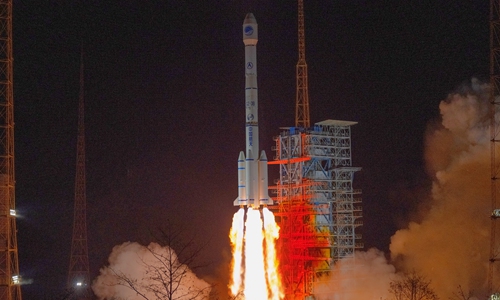Chinese space industry insiders debunk Western media claims launch failures due to US chip restrictions
By Deng Xiaoci Source:Global Times Published: 2020/4/13 20:46:27

Photo: Guo Wenbin
Chinese space industry insiders on Monday debunked Western media claims that attest China's recent rocket launch failures to US chip export restrictions on China, pointing out that the country's rocket control systems have mastered complete localization for a long time, and China's space development sector is independent of any Western influence.
German public broadcaster DW's Chinese language channel on Saturday cited a Taiwan-based military expert, who floated a conspiracy theory alleging the rising failure rate of China's space industry as being caused by US chip export restrictions as part of the US-led trade war against China.
China's space sector has recently encountered rarely-seen setbacks twice within a month—firstly, the maiden flight of the newly developed variant of the Long March-7 carrier rocket, known as the Long March-7A on March 16 and the launch of the veteran Long March-3B carrying an Indonesian commercial satellite on April 9.
An insider with the state carrier rocket developer approached by the Global Times said on the condition of anonymity that a probe into the two failures was underway, and the errors causing the failures have not been located as of yet, and therefore it has not yielded any conclusions.
He also stressed that the chips used for Chinese rocket control systems "are not from the US, period."
"The Chinese systems and related research have already achieved redundant capabilities [to increase reliability], and even errors of single point components will not affect overall performance," he said, noting that Western media claims were based on no evidence, and the so-called Taiwan-based expert clearly has no clue in regards to what he is talking about.
Agreeing with the insider, Song Zhongping, a military expert and TV commentator, told the Global Times on Monday that robust strides made in China's space development program lies greatly in its independence.
"Components used in China's space sector have achieved full localization long ago, meaning they are entirely independent from Western suppliers," Song said.
Insiders also shrugged their shoulders over Western media hype as well as Taiwan's pan-green pro-independence coalition's baseless claims, saying that "we just need to keep our strategic composure, and that current difficulties will only be temporary."
As of April 12, there have been 27 space launches worldwide in 2020. China succeeded in 7 out of 9 attempts. In addition, a series of China's space projects are progressing well, as a trial version of China's new-generation manned spaceship has been tested at the Wenchang Space Launch Center in South China's Hainan Province. The experimental spaceship is expected to be launched with no crew in mid to late April on the maiden flight of the Long March-5B carrier rocket.
While the US' SpaceX, despite having successfully launched a new batch of its Starlink Satellites, its Falcon 9, missed a landing on a floating platform out at sea on February 17, the first time it happened in almost four years.
Another SpaceX Falcon 9 mission on March 18 also experienced a rare in-flight engine failure with one of its nine first stage engines soon after launch, with an accident causing a loss of thrust that was fortunately compensated by other Merlin engines that fired a little longer, and the launch mission was eventually pulled off despite the error.
However, its first stage again missed a landing attempt on SpaceX's drone ship anchored in the Atlantic Ocean, northeast of Cape Canaveral, the second time within a month.